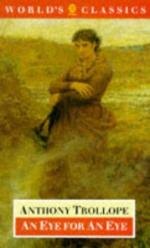“And I too have taken a fancy to him, Father Marty.”
“Shure and how could you help it?”
“But he mustn’t do as he pleases with me.” Father Marty looked up into her face as though he did not understand her. “If I were alone, as you are, I could afford, like you, to indulge in the pleasure of a bright face. Only in that case he would not care to let me see it.”
“Bedad thin, Misthress O’Hara, I don’t know a fairer face to look on in all Corcomroe than your own,—that is when you’re not in your tantrums, Misthress O’Hara.” The priest was a privileged person, and could say what he liked to his friend; and she understood that a priest might say without fault what would be very faulty if it came from any one else.
“I’m in earnest now, Father Marty. What shall we do if our darling Kate thinks of this young man more than is good for her?” Father Marty raised his hat and began to scratch his head. “If you like to look at the fair face of a handsome lad—”
“I do thin, Misthress O’Hara.”
“Must not she like it also?”
“I’ll go bail she likes it,” said the priest.
“And what will come next?”
“I’ll tell you what it is, Misthress O’Hara. Would you want to keep her from even seeing a man at all?”
“God forbid.”
“It’s not the way to make them happy, nor yet safe. If it’s to be that way wid her, she’d better be a nun all out; and I’d be far from proposing that to your Kate.”
“She is hardly fit for so holy a life.”
“And why should she? I niver like seeing too many of ’em going that way, and them that are prittiest are the last I’d send there. But if not a nun, it stands to reason she must take chance with the rest of ’em. She’s been too much shut up already. Let her keep her heart till he asks her for it; but if he does ask her, why shouldn’t she be his wife? How many of them young officers take Irish wives home with ’em every year. Only for them, our beauties wouldn’t have a chance.”
CHAPTER VII.
Father Marty’s hospitality.
Such was the philosophy, or, perhaps, it may be better said such was the humanity of Father Marty! But in encouraging Mrs. O’Hara to receive this dangerous visitor he had by no means spoken without consideration. In one respect we must abandon Father Marty to the judgment and censure of fathers and mothers. The whole matter looked at from Lady Scroope’s point of view was no doubt very injurious to the priest’s character. He regarded a stranger among them, such as was Fred Neville, as fair spoil, as a Philistine to seize whom and capture him for life on behalf of any Irish girl would be a great triumph;—a spoiling of the Egyptian to the accomplishment of which he would not hesitate to lend his priestly assistance, the end to be accomplished, of course, being marriage. For Lord Scroope and his family and his blood and




